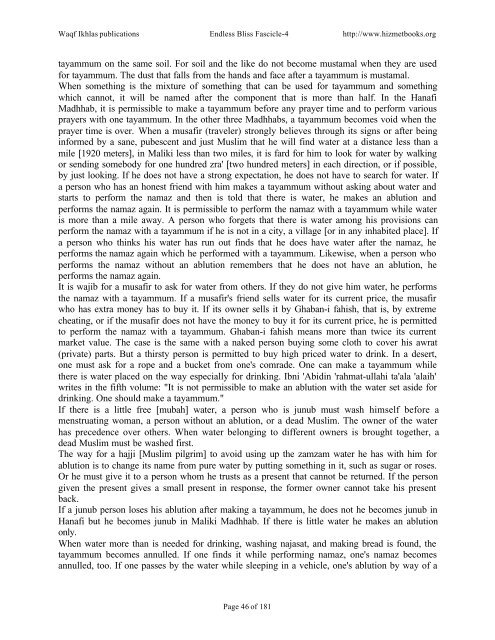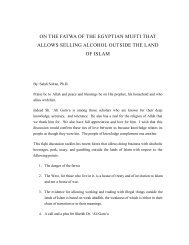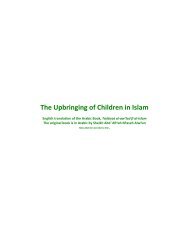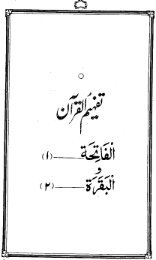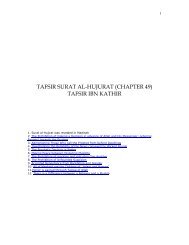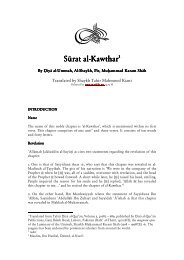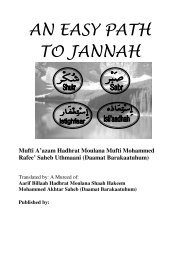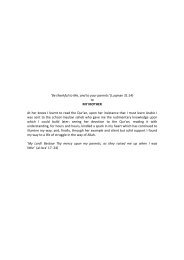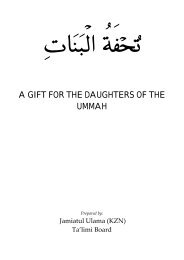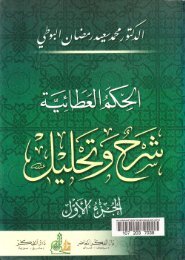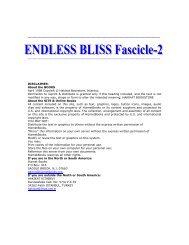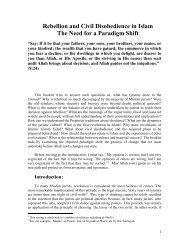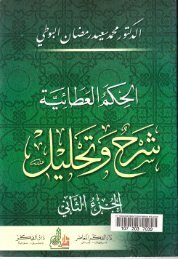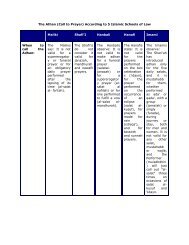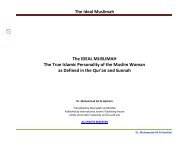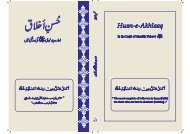ENDLESS BLISS FASCICLE-4
ENDLESS BLISS FASCICLE-4
ENDLESS BLISS FASCICLE-4
You also want an ePaper? Increase the reach of your titles
YUMPU automatically turns print PDFs into web optimized ePapers that Google loves.
Waqf Ikhlas publications Endless Bliss Fascicle-4 http://www.hizmetbooks.org<br />
tayammum on the same soil. For soil and the like do not become mustamal when they are used<br />
for tayammum. The dust that falls from the hands and face after a tayammum is mustamal.<br />
When something is the mixture of something that can be used for tayammum and something<br />
which cannot, it will be named after the component that is more than half. In the Hanafi<br />
Madhhab, it is permissible to make a tayammum before any prayer time and to perform various<br />
prayers with one tayammum. In the other three Madhhabs, a tayammum becomes void when the<br />
prayer time is over. When a musafir (traveler) strongly believes through its signs or after being<br />
informed by a sane, pubescent and just Muslim that he will find water at a distance less than a<br />
mile [1920 meters], in Maliki less than two miles, it is fard for him to look for water by walking<br />
or sending somebody for one hundred zra' [two hundred meters] in each direction, or if possible,<br />
by just looking. If he does not have a strong expectation, he does not have to search for water. If<br />
a person who has an honest friend with him makes a tayammum without asking about water and<br />
starts to perform the namaz and then is told that there is water, he makes an ablution and<br />
performs the namaz again. It is permissible to perform the namaz with a tayammum while water<br />
is more than a mile away. A person who forgets that there is water among his provisions can<br />
perform the namaz with a tayammum if he is not in a city, a village [or in any inhabited place]. If<br />
a person who thinks his water has run out finds that he does have water after the namaz, he<br />
performs the namaz again which he performed with a tayammum. Likewise, when a person who<br />
performs the namaz without an ablution remembers that he does not have an ablution, he<br />
performs the namaz again.<br />
It is wajib for a musafir to ask for water from others. If they do not give him water, he performs<br />
the namaz with a tayammum. If a musafir's friend sells water for its current price, the musafir<br />
who has extra money has to buy it. If its owner sells it by Ghaban-i fahish, that is, by extreme<br />
cheating, or if the musafir does not have the money to buy it for its current price, he is permitted<br />
to perform the namaz with a tayammum. Ghaban-i fahish means more than twice its current<br />
market value. The case is the same with a naked person buying some cloth to cover his awrat<br />
(private) parts. But a thirsty person is permitted to buy high priced water to drink. In a desert,<br />
one must ask for a rope and a bucket from one's comrade. One can make a tayammum while<br />
there is water placed on the way especially for drinking. Ibni 'Abidin 'rahmat-ullahi ta'ala 'alaih'<br />
writes in the fifth volume: "It is not permissible to make an ablution with the water set aside for<br />
drinking. One should make a tayammum."<br />
If there is a little free [mubah] water, a person who is junub must wash himself before a<br />
menstruating woman, a person without an ablution, or a dead Muslim. The owner of the water<br />
has precedence over others. When water belonging to different owners is brought together, a<br />
dead Muslim must be washed first.<br />
The way for a hajji [Muslim pilgrim] to avoid using up the zamzam water he has with him for<br />
ablution is to change its name from pure water by putting something in it, such as sugar or roses.<br />
Or he must give it to a person whom he trusts as a present that cannot be returned. If the person<br />
given the present gives a small present in response, the former owner cannot take his present<br />
back.<br />
If a junub person loses his ablution after making a tayammum, he does not he becomes junub in<br />
Hanafi but he becomes junub in Maliki Madhhab. If there is little water he makes an ablution<br />
only.<br />
When water more than is needed for drinking, washing najasat, and making bread is found, the<br />
tayammum becomes annulled. If one finds it while performing namaz, one's namaz becomes<br />
annulled, too. If one passes by the water while sleeping in a vehicle, one's ablution by way of a<br />
Page 46 of 181


